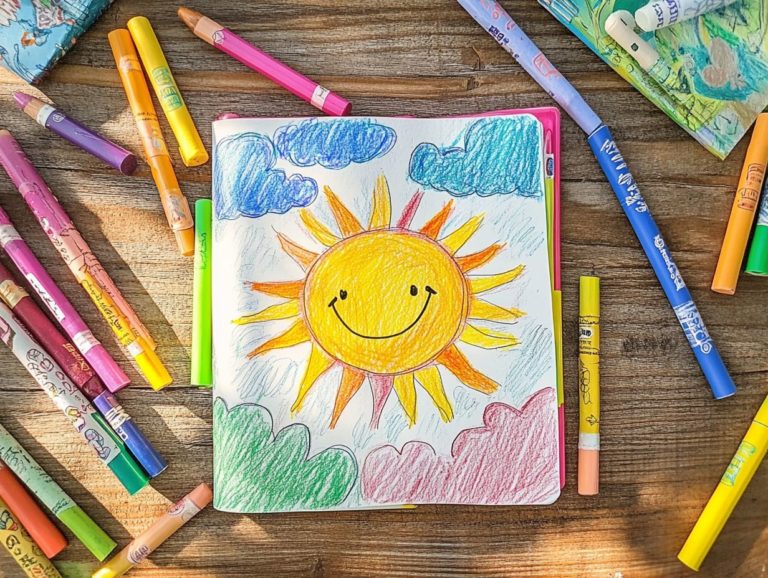5 Essential Resources for Emotional Awareness
Contents
- Essential Resources for Enhancing Emotional Intelligence
- 2. Mindfulness and Meditation Practices
- 3. Self-Help Books or Workshops
- 4. Support Groups or Communities
- 5. Journaling or Creative Expression
- Importance of Emotional Awareness
- How Resources Enhance Emotional Awareness
- What Are the Potential Challenges in Developing Emotional Awareness?
- How Can One Incorporate These Resources into Their Daily Life?
- What Are Some Signs That Someone May Need to Work on Their Emotional Awareness?
- How Can Emotional Awareness Benefit Relationships and Personal Growth?
- Frequently Asked Questions
- What are the 5 essential resources for emotional awareness?
- How does self-reflection help with emotional awareness?
- What is the role of mindfulness in emotional awareness?
- Can therapy or counseling be a helpful resource for emotional awareness?
- How does support from loved ones contribute to emotional awareness?
- What are some examples of personal growth activities that can promote emotional awareness?
Introduction
Emotional awareness is an essential skill that can significantly enrich your interpersonal relationships and foster your personal growth and academic achievement.
This article delves into five invaluable resources that can help you cultivate a deeper understanding of your emotions: therapy, mindfulness practices, self-help literature, support communities, and creative expression. These resources can enhance your emotional intelligence, self-awareness, managing your emotions, and social skills.
It also highlights the importance of emotional awareness, the challenges you might encounter while developing it, and how you can seamlessly integrate these resources into your daily life to improve your emotional states and decision-making abilities.
Don’t wait discover the signs that indicate it’s time to enhance your emotional awareness today!
Key Takeaways:

- Therapy or counseling provides a safe space for exploring and understanding your emotions.
- Mindfulness and meditation enhance self-awareness and improve emotional management and stress control.
- Self-help books or workshops offer practical tools for developing emotional intelligence and effective communication.
1. Therapy or Counseling
Therapy helps you unlock the secrets of your emotions by nurturing your emotional intelligence, self-awareness, managing your emotions, and social skills.
These practices enable you to understand your emotional states and manage your reactions, essential for building healthy relationships and leadership skills.
Esteemed mental health professionals like Kendra Cherry and Amy Morin highlight the critical role of therapy in fostering emotional growth and resilience. Engaging in therapy can elevate your emotional quotient (EQ) and refine your decision-making abilities.
Among the range of therapeutic techniques, Cognitive Behavioral Therapy (CBT) a type of therapy that helps you change negative thinking patterns stands out as particularly effective. CBT encourages you to identify and challenge negative thoughts, promoting healthier emotional responses.
Mental health practitioners often share testimonials from clients who experience a renewed sense of control over their feelings and reactions. As a result, they report enhanced social interactions and leadership capabilities.
In essence, therapy equips you with the tools to navigate your own emotions while cultivating better relationships with others by enhancing your empathy and communication skills.
Essential Resources for Enhancing Emotional Intelligence
2. Mindfulness and Meditation Practices
Mindfulness and meditation practices are powerful tools for enhancing your emotional intelligence, increasing self-awareness, and mastering stress management. By engaging in these practices, you can gain a deeper understanding of your emotional patterns and reactions. This insight allows you to improve your self-regulation and decision-making abilities, making better decisions in both personal and professional settings.
Techniques like cognitive reframing, which involves changing the way you think about a situation to alter your emotional response, can also help you cultivate empathy and motivation. This leads to positive interactions in your relationships and enhances your overall mental health. These practices also boost your inner motivation, building lasting emotional strength.
Exploring various techniques, such as guided meditation, offers a gentle introduction to the practice, making it accessible even if you’re just starting out. Breath awareness presents a simple yet impactful way to stay anchored in the present moment, enabling you to recognize and address emotions as they arise. Meanwhile, body scans provide a valuable method for checking in with physical sensations, effectively highlighting areas of tension or discomfort.
Incorporating these practices into your daily routine can be as straightforward as dedicating a few minutes each morning to focus on your breath or using guided sessions through meditation apps.
This approach promotes a more centered and emotionally resilient mindset, helping you navigate life’s challenges with greater ease and enhancing your interpersonal relationships. Don t miss out on the chance to enrich your emotional well-being by starting these mindfulness practices today!
3. Self-Help Books or Workshops
Self-help books and workshops are essential tools for developing your emotional intelligence. They guide you to enhance your self-awareness, self-regulation, and improve your interpersonal relationships. Experts like Daniel Goleman create these valuable resources, providing practical insights and strategies that foster your leadership skills and emotional awareness.
By exploring core concepts such as self-regulation, motivation, and social skills, you can cultivate the ability to respond thoughtfully rather than merely react in various situations. Many of these materials highlight the importance of understanding your own emotions and those of others, offering exercises that promote active listening, which involves fully focusing on the speaker, and effective communication.
For example, workshops may feature group activities where participants share personal experiences. This allows you to practice vulnerability while simultaneously building trust among peers. Engaging with these resources sharpens your emotional skills and paves the way for remarkable personal growth and resilience, enabling you to tackle life’s challenges with newfound ease. Often, they also provide valuable feedback to help you refine your skills.
4. Support Groups or Communities

Support groups and communities offer invaluable opportunities to enhance your emotional intelligence through shared experiences and collective learning. These environments nurture the development of social skills and emotional awareness, allowing you to both give and receive feedback on emotional reactions and interpersonal dynamics.
Such interactions can significantly boost your empathy, motivation, and social awareness, underscoring the importance of mental health in forging strong community bonds. When you join these groups, you cultivate a profound sense of belonging that is crucial for your emotional well-being.
Various types of communities are available, from online forums where you can connect anonymously from the comfort of your home to local meetups that encourage face-to-face interactions and real-time support. Take, for instance, programs like the National Alliance on Mental Illness (NAMI), which provide structured support in both virtual and in-person settings, helping participants share their stories and learn from one another.
Peer-led initiatives often create safe spaces for you to explore your feelings, leading to enhanced coping strategies, resilience, and leadership skills. These collective experiences not only elevate your emotional intelligence but also pave the way for lasting friendships and deeper connections within your community.
Engaging in these groups provides ample opportunity for feedback, intrinsic motivation, and positive actions. Don t miss out on the chance to enrich your emotional well-being by joining a community today!
5. Journaling or Creative Expression
Journaling and creative expression are powerful allies in enhancing your emotional intelligence, fostering awareness, and promoting self-regulation. By documenting your thoughts and feelings, you can pinpoint emotional patterns and reactions, which ultimately sharpens your decision-making abilities and deepens your empathy. Engaging in creative outlets whether through writing, art, or music encourages positive actions that significantly contribute to your mental health, interpersonal relationships, and overall well-being.
These practices not only help you explore your feelings but also create a safe haven for you to express your innermost thoughts without fear of judgment. Techniques like free writing or guided journaling prompts can help you dig deeper into your feelings, revealing underlying beliefs and assumptions. For instance, prompts such as “What triggers my anxiety, and how do I respond?” or “Describe a time I felt truly happy and what factors contributed to that joy” can unlock profound insights about yourself. Many individuals find that these techniques lead to improved relationship skills and social awareness.
Exciting research shows that consistent journaling dramatically reduces stress and anxiety! Many success stories showcase remarkable transformations in self-awareness and interpersonal relationships. Creative expression whether through painting, composing music, or any other medium further enables you to articulate your emotions in unique ways, making it an invaluable aspect of your personal development journey. Engaging in these activities also enhances your motivation and overall well-being.
Importance of Emotional Awareness
Emotional awareness stands as a cornerstone of emotional intelligence, profoundly impacting your mental health, interpersonal relationships, academic achievement, and overall well-being. By fostering emotional awareness, you enhance your self-awareness, enabling you to accurately recognize your emotional states and reactions.
This elevated insight is invaluable across various life contexts, enabling you to manage stress more effectively, tackle challenges with resilience, and make informed decisions that resonate with your core values. In your relationships, a finely tuned understanding of your emotions promotes greater compatibility and understanding with your partner, while also reducing the likelihood of conflicts. It is also essential for improving workplace dynamics and teamwork.
Within the workplace, emotional awareness is closely linked to teamwork and leadership capabilities. It allows you to respond thoughtfully to the emotions of others, creating a friendlier work atmosphere. As you cultivate emotional awareness, you pave the way for richer life experiences, creating a positive feedback loop that enhances both your personal and professional success. Taking an EQ test or participating in psychometric tests gives you a clearer understanding of your emotional strengths and areas for improvement.
How Resources Enhance Emotional Awareness
Resources like therapy, self-help books, and support groups can greatly enhance your emotional awareness and self-awareness by equipping you with the tools and insights needed to better understand your emotional patterns and emotional states. These resources inspire self-reflection and offer valuable feedback, both of which are crucial for recognizing your emotional triggers and developing healthier responses. Engaging in workshops and community activities can help you forge deeper interpersonal relationships and connections, enabling you to share your experiences, receive feedback, and learn from others.
Take therapy, for instance; cognitive behavioral techniques, which help you change negative thought patterns, are designed to help you pinpoint those automatic thoughts that contribute to negative emotions, paving the way for meaningful change. Self-help books often feature exercises that encourage you to journal your feelings, nurturing a habit of introspection. Meanwhile, support groups create a welcoming space where you can receive constructive feedback and practice effective communication, assisting you in identifying emotions that may have slipped under your radar.
This vibrant exchange of experiences not only enhances your understanding but also cultivates a supportive network where vulnerability is celebrated, ultimately leading to a boost in your emotional intelligence.
What Are the Potential Challenges in Developing Emotional Awareness?

Developing emotional awareness and social skills can be quite the journey, presenting a range of challenges along the way. You might find it difficult to recognize and regulate your emotional reactions, often rooted in past experiences or mental health issues. These challenges can significantly affect your mental health.
Self-reflection may not come easily. This can leave you feeling somewhat in the dark about your emotional patterns. On top of that, societal norms and expectations can complicate matters further; you might feel pressured to suppress your emotions instead of exploring them openly. This can hinder your social awareness and empathy.
Fear of vulnerability often stands as a significant barrier to forming meaningful connections. You may worry about being judged or misunderstood when you express your feelings. A lack of supportive relationships can add to this struggle, leading to feelings of isolation that make it tough to share and process emotions authentically.
Past trauma can create a mental block. This makes the prospect of emotional exploration even more daunting.
Start today by creating a safe space for self-reflection, maybe through journaling or therapy. Seeking guidance from mental health professionals such as Kendra Cherry, Daniel Goleman, and Amy Morin can also be insightful. Additionally, engaging in fun activities for building emotional awareness can provide community support that encourages healthy emotional expression, which can be incredibly rewarding and uplifting! Remember, vulnerability is not a weakness; it’s a strength. Embracing your emotions can lead to deeper connections and remarkable personal growth.
How Can One Incorporate These Resources into Their Daily Life?
Incorporating resources such as mindfulness practices, support groups, and journaling into your daily life can significantly enhance your emotional awareness and overall emotional intelligence. By dedicating time each day to reflect on your emotions, practice mindfulness, or engage with community support, you can cultivate a deeper understanding of your emotional states. This will improve your ability to manage your emotions and decision-making.
To start, you might consider scheduling a brief five to ten minutes each morning for mindfulness meditation. Focus on your breath or visualize a calming scene to set a positive tone for your day. In the evening, journaling could involve prompts like What emotion did I feel most today? or What triggered that feeling? This practice allows for valuable self-reflection, clarity, and stress management.
Finding a local support group could be as simple as exploring online platforms or checking out community centers. Commit to attending at least once a month. Setting realistic goals like writing in your journal three times a week can make your progress measurable. Tracking these activities will provide you with insights into your emotional growth over time.
What Are Some Signs That Someone May Need to Work on Their Emotional Awareness?
You might notice several signs that suggest it’s time to enhance your emotional awareness and emotional intelligence. Persistent difficulty in managing your emotional reactions or engaging in unhealthy relationships can be strong indicators. A lack of self-reflection and frequent misunderstandings in communication often point to low emotional intelligence or emotional quotient (EQ).
You may find yourself easily overwhelmed by stress. Feeling disconnected from your emotions can create barriers to meaningful connections with others. This emotional disconnect can lead to feelings of isolation and anxiety, highlighting that emotional awareness and empathy are essential for effective expression in your relationships.
Recognizing these signs is the pivotal first step toward positive change. Seeking support from friends, therapy, or self-help resources can significantly enhance your emotional understanding. Ultimately, this will foster healthier connections and improve your overall mental health.
How Can Emotional Awareness Benefit Relationships and Personal Growth?
Emotional awareness is essential for enhancing your relationships and fostering personal growth. It promotes better communication, empathy, and self-regulation. When you cultivate emotional awareness, you navigate complex interpersonal dynamics and workplace challenges more adeptly, leading to healthier and more fulfilling connections.
This awareness encourages self-reflection and intrinsic motivation, enabling you to take positive actions that align with your values and goals. By developing emotional intelligence, you can manage conflicts, stress, and academic achievement more effectively, gaining a clearer understanding of your own feelings and those of others.
For instance, when disagreements arise, an emotionally aware person is likely to approach the situation with calmness and empathy, paving the way for constructive dialogue rather than emotional escalation. This approach helps resolve conflicts swiftly and strengthens relationships through mutual understanding.
Such awareness fosters deeper connections, allowing you to express your needs and feelings authentically, which cultivates intimacy and trust. Ultimately, improved emotional intelligence enhances your interpersonal interactions and your overall sense of life satisfaction, as you feel more in tune with yourself and your relationships, including social and academic achievements.
Frequently Asked Questions

What are the 5 essential resources for emotional awareness?
- Self-reflection
- Mindfulness
- Therapy or counseling
- Support from loved ones
- Personal growth activities
Resources such as Verywell Mind and EQ tests can also be helpful.
How does self-reflection help with emotional awareness?
Self-reflection allows individuals to examine their thoughts, feelings, and behaviors, leading to a deeper understanding of their emotions and interpersonal relationships. It helps identify patterns and triggers, making it easier to manage emotions effectively.
What is the role of mindfulness in emotional awareness?
Mindfulness is the practice of being present and aware of one’s thoughts, feelings, and surroundings without judgment. It helps individuals become more in tune with their emotions and increases self-awareness.
Can therapy or counseling be a helpful resource for emotional awareness?
Yes, therapy or counseling can be a valuable resource for emotional awareness. A trained professional can provide tools and techniques to manage emotions and work through any underlying issues contributing to emotional difficulties.
How does support from loved ones contribute to emotional awareness?
Having a supportive network of family and friends provides a safe space to share and process emotions. They can offer different perspectives and provide comfort and validation, aiding in emotional awareness and regulation.
What are some examples of personal growth activities that can promote emotional awareness?
Personal growth activities such as journaling, meditation, and self-care from programs like Positive Action can help individuals connect with their emotions and increase emotional awareness. These activities also promote self-reflection and mindfulness, further enhancing emotional awareness.
Start your journey towards emotional awareness today and transform your life and relationships!






